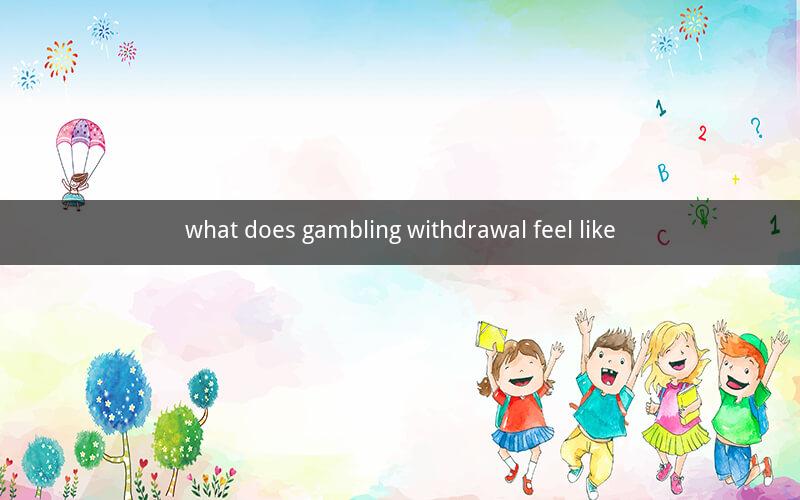
Table of Contents
1. Understanding Gambling Addiction
2. The Concept of Withdrawal
3. Symptoms of Gambling Withdrawal
- Emotional Symptoms
- Physical Symptoms
- Cognitive Symptoms
4. The Psychological Impact of Withdrawal
5. Coping Strategies for Gambling Withdrawal
- Support Systems
- Therapeutic Approaches
- Self-Care Practices
6. The Role of Professional Help
7. The Journey to Recovery
8. Case Studies and Real-Life Experiences
9. The Importance of Education and Awareness
10. Conclusion
1. Understanding Gambling Addiction
Gambling addiction, also known as problem gambling, is a disorder characterized by an individual's inability to control their gambling behavior. It is a complex condition that affects not only the gambler but also their family and friends. Understanding the nature of gambling addiction is crucial in comprehending the feelings associated with withdrawal.
2. The Concept of Withdrawal
Withdrawal is a physical and psychological response that occurs when an individual stops using a substance or engaging in an activity that they have become dependent on. In the context of gambling, withdrawal refers to the symptoms that arise when a person stops gambling after a period of compulsive behavior.
3. Symptoms of Gambling Withdrawal
Gambling withdrawal can manifest in various ways, affecting different aspects of an individual's life.
3.1 Emotional Symptoms
- Anxiety
- Depression
- Irritability
- Mood swings
- Restlessness
- Feelings of emptiness or boredom
3.2 Physical Symptoms
- Insomnia
- Fatigue
- Headaches
- Nausea
- Tremors
- Increased heart rate
3.3 Cognitive Symptoms
- Difficulty concentrating
- Memory problems
- Obsessive thoughts about gambling
- Decreased motivation
- Impaired decision-making
4. The Psychological Impact of Withdrawal
The psychological impact of gambling withdrawal can be profound. Individuals may experience intense cravings for gambling, which can lead to feelings of despair and hopelessness. The psychological toll can also result in strained relationships, financial difficulties, and a general sense of loss of control.
5. Coping Strategies for Gambling Withdrawal
Coping with gambling withdrawal requires a multifaceted approach that addresses both the physical and psychological symptoms.
5.1 Support Systems
- Joining a support group, such as Gamblers Anonymous
- Seeking support from family and friends
- Engaging in social activities to distract from thoughts of gambling
5.2 Therapeutic Approaches
- Cognitive-behavioral therapy (CBT) to address negative thought patterns
- Dialectical behavior therapy (DBT) to manage emotions and improve relationships
- Contingency management to reinforce positive behaviors
5.3 Self-Care Practices
- Regular exercise
- Healthy eating habits
- Adequate sleep
- Mindfulness and meditation practices
6. The Role of Professional Help
Professional help is essential for individuals struggling with gambling withdrawal. Therapists, counselors, and addiction specialists can provide tailored support and treatment plans to help individuals manage their symptoms and develop strategies for long-term recovery.
7. The Journey to Recovery
Recovery from gambling addiction is a long-term process that requires dedication and perseverance. It involves identifying triggers, developing coping mechanisms, and learning to live a fulfilling life without the need for gambling.
8. Case Studies and Real-Life Experiences
Many individuals have shared their experiences with gambling withdrawal, providing valuable insights into the challenges and triumphs of recovery. These stories serve as a testament to the possibility of overcoming addiction and rebuilding one's life.
9. The Importance of Education and Awareness
Educating oneself and others about gambling addiction and withdrawal is crucial in preventing and treating this disorder. Awareness campaigns, workshops, and community programs can help reduce the stigma associated with addiction and provide resources for those in need.
10. Conclusion
Gambling withdrawal is a complex and challenging experience that requires a comprehensive approach to recovery. By understanding the symptoms, seeking professional help, and developing coping strategies, individuals can overcome their addiction and lead fulfilling lives.
Questions and Answers
1. Q: How long does gambling withdrawal typically last?
A: The duration of gambling withdrawal can vary widely, from a few days to several months.
2. Q: Can someone experience gambling withdrawal without having a gambling addiction?
A: While it is less common, it is possible for someone without a gambling addiction to experience withdrawal symptoms if they have been engaging in excessive gambling.
3. Q: Are there medications that can help with gambling withdrawal?
A: There are no specific medications for gambling withdrawal, but some medications may be prescribed to manage symptoms such as anxiety or depression.
4. Q: Can gambling withdrawal lead to suicidal thoughts?
A: Yes, gambling withdrawal can lead to severe emotional distress, which may include suicidal thoughts. It is crucial to seek immediate help if these thoughts arise.
5. Q: How can someone tell if they have a gambling addiction?
A: Signs of a gambling addiction include a preoccupation with gambling, lying about gambling activities, chasing losses, and continuing to gamble despite negative consequences.
6. Q: Can therapy help with gambling withdrawal?
A: Yes, therapy can be highly effective in helping individuals manage gambling withdrawal symptoms and develop strategies for recovery.
7. Q: Is it normal to feel guilty during gambling withdrawal?
A: Feeling guilty is a common emotion during gambling withdrawal. It is important to recognize that addiction is a disease, and seeking help is a sign of strength.
8. Q: Can family therapy help in the recovery process?
A: Yes, family therapy can be beneficial in repairing relationships damaged by gambling addiction and providing support to the affected family members.
9. Q: Are there support groups available for family members of gamblers?
A: Yes, there are support groups such as Al-Anon and Gam-Anon specifically designed for family members of individuals with gambling problems.
10. Q: How can someone prevent a relapse after overcoming gambling addiction?
A: Preventing relapse involves identifying and avoiding triggers, developing a strong support system, and maintaining a healthy lifestyle. Regular check-ins with a therapist or counselor can also be helpful.